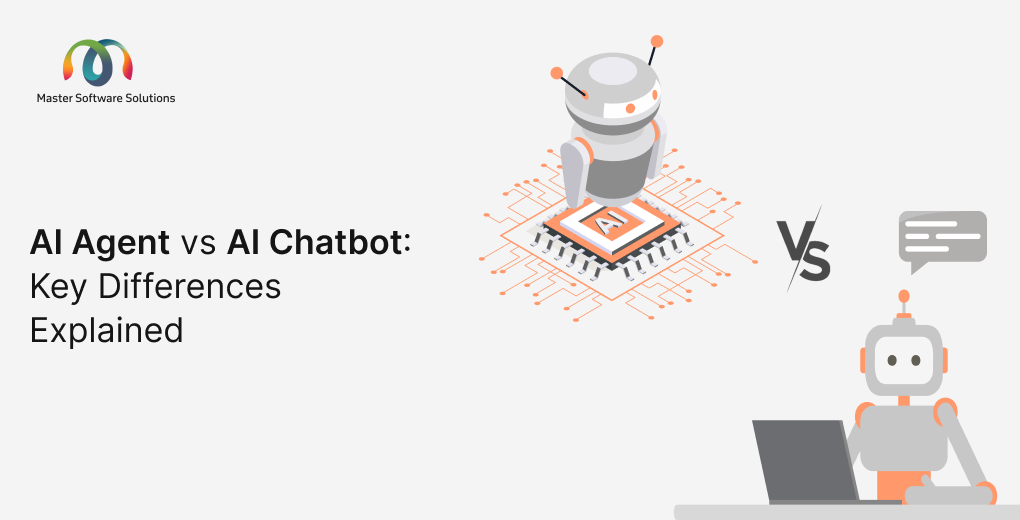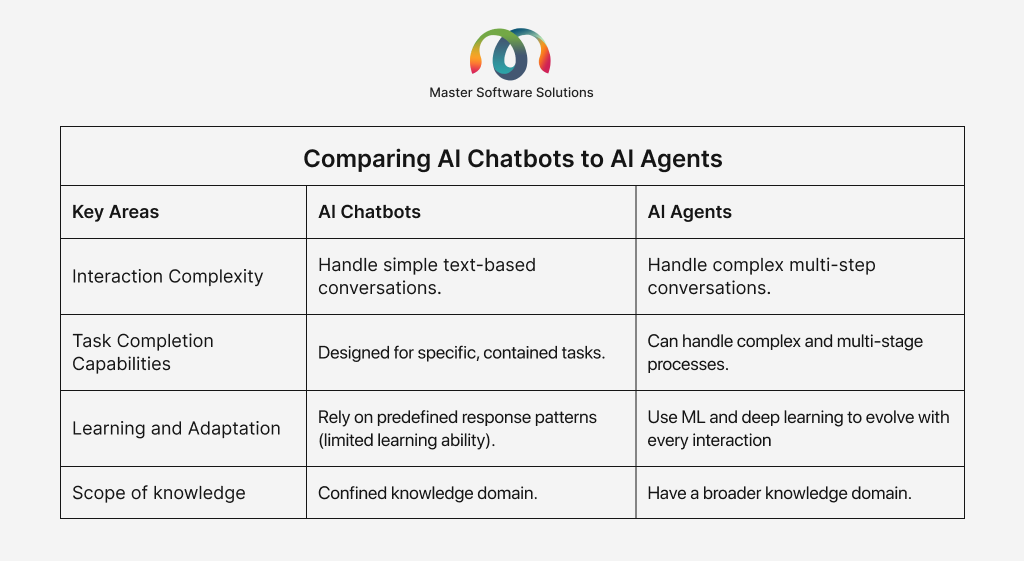With increasing customer expectations for fast, personalized service across multiple channels, businesses rely on AI chatbots and AI agents.
According to a report by Salesforce, “81% of customers expect faster service as technology advances, and 73% expect a personalized experience.”
Chatbots, for many years, have remained a foundation for customer service automation, but they are not enough. Both free up your service reps, enabling them to focus on more complex cases that require critical thinking and empathy. AI agents and AI chatbots are available to support customers 24/7.
This blog will explore chatbots and autonomous AI agents, the difference between them, and which ones are the best for your business.
This blog covers:
What is an AI Chatbot?
AI chatbots are software programs that are designed to imitate human conversations through text or voice interactions. They use natural language processing (NLP) and machine learning (ML) to understand customer queries and generate accurate responses.
The chatbots are designed using a specific set of rules or are trained on datasets, empowering them to handle predefined tasks and generate responses within a limited scope. They can assist with common questions or simple tasks; however, they are unable to understand context beyond their training and make decisions independently.
AI chatbot: Use cases
AI-powered chatbots offer various applications that focus on improving customer service, streamlining business processes, and providing a personalized experience. Detailed look at AI chatbots:
Customer service
- Instant support – Chatbots can provide prompt answers to common queries, reducing wait times.
- Agent assistance – They can gather information, suggest responses, and handle routine enquiries, freeing your rep agents to focus on complex cases.
- Personalized experience – Chatbots can personalize the chats based on customers’ preferences and past interactions, enhancing engagement and a relevant experience.
- Multilingual support – AI chatbots can communicate in multiple languages to service a global customer base.
Sales and marketing
- Lead generation – Chatbots can interact with potential customers, gather information, qualify leads, and streamline the sales process.
- Sales automation – They can automate repetitive tasks, streamlining and speeding up the order-to-cash cycle.
- Personalized marketing – They can deliver tailored messages based on user behaviour and preferences to enhance customer experience and engagement.
- Content delivery – Chatbots can distribute relevant content, including newsletters or promotions, based on the customer’s interest.
Client training
- Onboarding support – Chatbots can assist you with onboarding new clients, providing answers about how the company’s processes work.
- Knowledge base – They can be used as an accessible knowledge base for your clients to handle their common hurdles.
- Training and development – Chatbots can provide personalized training modules and assessments, improving employee skills and knowledge.
Other use cases
- E-commerce – Chatbots can help your customers track their orders, inquiries, and returns.
- Healthcare – They can provide information about medical conditions, answer patient questions, and help schedule appointments.
What is an AI Agent?
An AI agent is an advanced AI-powered assistant designed to mimic human capabilities for various tasks. They can understand and generate human language text, process and analyze large amounts of information, and assist with complex tasks, including writing, coding, problem solving, and creative tasks.
These agents are developed using large language models (LLMs) that are trained on large datasets to enhance engagement with context-aware conversation. They can adapt and learn from their past interactions to enhance productivity and decision-making.
83% of decision-makers plan to increase their AI investment over the next year.
AI agent use cases
AI agents can be used in a wide range of applications to improve process efficiency and productivity. Some of the specific AI agent use cases are:
Customer support and service
- Automated responses – AI agents can handle common customer queries and automate repetitive tasks.
- Knowledge base access – They can provide customer and support staff with access to relevant knowledge base articles, FAQs, and documentations.
- Escalation to human agents – They can seamlessly pass complex tasks to humans, transferring context and relevant information for smooth handoffs and controlled outcomes.
- Personalized experience – AI agents can analyze the customer data and past interactions to provide personalized recommendations, responses, and service.
Sales and marketing
- Lead management – AI agents can qualify leads, build lead lists, and automate onboarding.
- Personalized marketing – These agents can create and implement targeted ad campaigns based on customer data and preferences.
- Content generation – AI agents can help you generate marketing content for email campaigns, website copy, and social media posts.
- Customer relationship management – AI agents can automate tasks within the CRM systems, including updating customer information and scheduling calls.
Supply chain and logistics
- Predictive maintenance – AI agents can analyze equipment data and systems to predict maintenance schedules and prevent failure.
- Route optimization – They can optimize routes, reduce transportation costs and carbon footprints, and improve efficiency.
- Predictive forecasts – AI agents can analyze historical data to identify trends and patterns for accurate forecasts, preventing supply chain disruptions.
Key Differences Between AI Agents and AI Chatbots
Although AI agents are more advanced in customer service, both AI agents and AI chatbots offer a wide range of possibilities to enhance customer service experience and drive business success. The line between them can be blurry, so here is the comparison between AI agents and AI chatbots in various key areas:
Interaction complexity
AI chatbots can assist with simple text-based conversations within the defined scope. They are perfect at answering common questions, explaining simple steps to the customers, and providing information from a structured database. They use pattern matching or basic natural language processing to interpret user inputs and choose the right responses from the pre-programmed options.
On the contrary, AI agents can engage in more complex, multi-step interactions. They can understand the input, break down a complex task into smaller multiple steps, and execute actions. These AI agents are sophisticated systems that use natural language understanding, context awareness, and decision-making algorithms to handle requests and adapt themselves based on real-time feedback and evolving conditions.
Task completion capabilities
AI chatbots are designed for specific tasks, and they shine when it comes to performing simple tasks, including answering simple questions, guiding users through predefined processes, or handling simple transactions. However, their capabilities are limited to a defined scope.
On the other hand, AI agents can handle complex, multiple-step processes, including booking hotels, comparing flight prices, and even suggesting activities. They don’t just follow the scripts; they solve problems in real-time, adapting to the evolving environment and new information.
Learning and adaptation
AI chatbots depend on static decisions or predefined response patterns and have limited learning and adaptation ability. Advanced AI chatbot implementation may include leveraging machine learning to improve response selection over a period of time. Chatbots might struggle to handle simple situations or queries that are outside of their training data.
Whereas AI agents use machine learning and deep learning algorithms and adaptive models that enhance their interactions over time. They can learn from past interactions to tackle evolving scenarios and adjust based on user feedback. AI agents use reinforcement learning and transfer learning to enhance their capabilities across subject matters.
Scope of knowledge
The AI chatbots are being implemented within confined domains such as products, services, or industries. Their database is limited to the data provided during training or through updates. Although some chatbots may access external databases or APIs, they cannot process information from multiple sources or expand their knowledge autonomously.
In contrast, AI agents have a broader scope of knowledge. They can access vast language models, real-time data streams, and various external resources to collect and process data. They can also remember past interactions to improve future conversations. AI agents can learn and remember the interaction, updating their knowledge base autonomously.
Why You Should Hire Master Software Solutions for AI Chatbot and AI Agent Development?
Master Software Solutions is an AI agent development company that offers end-to-end AI services, including consulting, and AI agent and AI chatbot development. We are a team of 90+ AI experts who are proficient in building scalable and custom AI agents, leveraging advanced technologies such as NLP, LLMs, ML, and deep learning. Our development services extend to continuous AI agent monitoring and fine-tuning to ensure their performance is at its peak. Contact us to discuss your AI agent development needs and see how we can help you.

